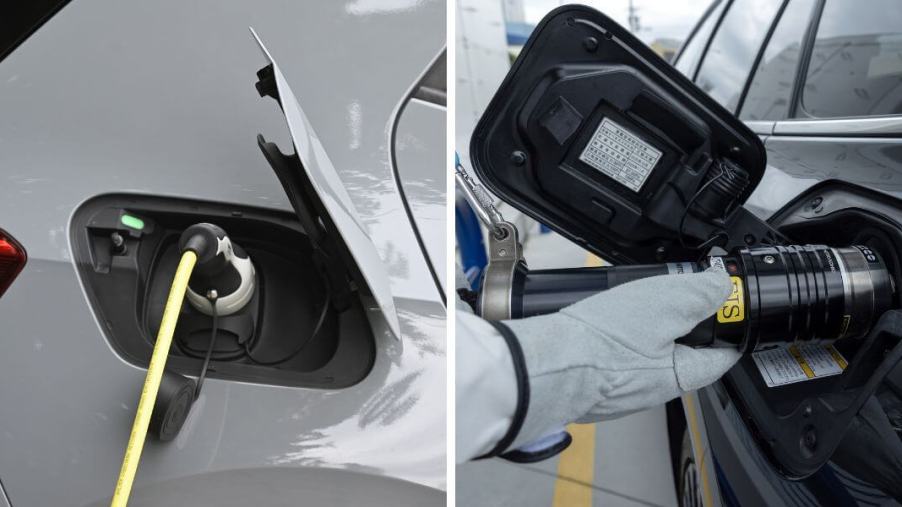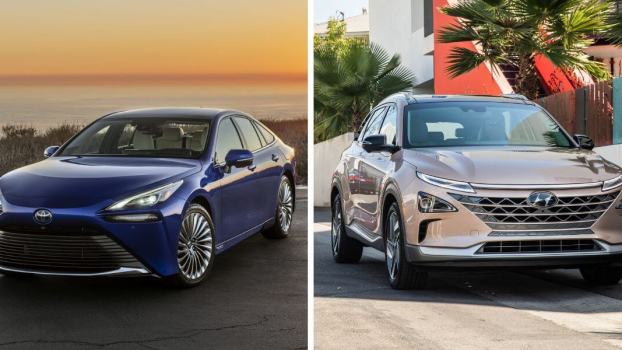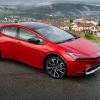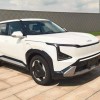
What Are the Differences Between Electric and Hydrogen-Powered Cars?
Electric cars are coming at us as fast and furious as any product in history. It’s almost like the buzz every time Apple creates a new iPhone, but not quite as loud. EVs appear to be the future of transportation, with many global governments supporting moving away from ICE vehicles to cleaner electric cars.
While EVs might be the future, hydrogen-powered cars offer specific benefits that could make them more attractive than EVs. Both EVs and hydrogen vehicles (often called fuel cell vehicles or FCEVs) use electric motors to power the wheels, but the way this electricity is stored or produced is a key difference. Here’s a look at the similarities and differences between EVs and FCEVs.
How does an electric car work?
Electric vehicles are also called battery electric vehicles (BEVs), powered by electric motor batteries. If you’ve ever owned a toy remote-controlled car, this is the same concept, but on a much larger scale.
Modern EVs include a bank of lithium-ion batteries located in the vehicle’s floor, sending power to the wheels. These cars provide clean energy with zero harmful tailpipe emissions expelled into the atmosphere. This alternative fuel type is much better for the environment than traditional gas and diesel-powered vehicles.
What are the pros and cons of EVs?
According to Car and Driver, some of the pros and cons of battery-powered electric cars are:
EV pros
- Performance and power delivery
- Clean motoring
- Less maintenance
EV cons
- Limited battery lifespan
- Charging times and availability
- Towing challenges
How do hydrogen-powered cars work?
Hydrogen-powered cars are similar to electric vehicles because both utilize electricity to power the electric motors. Unlike EVs, these fuel cell vehicles require liquid hydrogen to create the needed electricity. Additionally, one of the crucial differences between EVs and FCEVs is that hydrogen-powered cars have some exhaust. Thankfully, that exhaust is water vapor, which is not harmful to the environment.
The clean energy produced by fuel cell vehicles can make these cars more environmentally friendly and allow hydrogen to be an excellent alternative fuel source. Refueling an FCEV takes place at a designated station, much like refilling a gas-powered car with gasoline.
What are the pros and cons of fuel cell vehicles?
Car and Driver tells us the pros and cons of hydrogen-powered cars:
FCEV pros
- The technology works well
FCEV cons
How are EVs and FCEVs similar and different?
When we compare and contrast these two clean energy alternative fuel vehicle types, we find a few interesting things to consider. Currently, battery-powered electric cars have the upper hand with greater industry adoption, government support, and a much larger infrastructure. Electric vehicles have a long way to go, but hydrogen-powered cars have a longer journey to acceptance.
The one area where fuel cell vehicles have the upper hand compared to electric cars is refueling. Although many EVs can charge much faster than ever, they still can’t refuel as fast as a gas-powered car, which is similar to how long it will take to refuel tanks of liquid hydrogen for FCEVs.
Both vehicle types generate electricity and provide zero harmful tailpipe emissions to make them much better for the environment.
Electric vehicles have a huge lead over hydrogen-powered cars
Currently, the EV world, which was almost nonexistent 10 years ago, is exploding with new models every year. There are EVs of every shape, size, capability, and price, from the small and affordable Chevy Bolt EV to the massive off-road brute that is the GMC Hummer EV. Car and Driver highlights all the new EVs on sale this year, which is an impressive list.
On the flip side, only two fuel cell vehicles are available today. CarBuzz tells us that these two vehicles are the Toyota Mirai and Hyundai Nexo. These two hydrogen-powered cars are sold in limited areas, while EVs are sold almost everywhere. The availability of FCEVs could change in the near future if TopSpeed is to be believed. If this happens, we’ll have a real “chicken and egg” scenario, forcing expansion to the hydrogen infrastructure.




